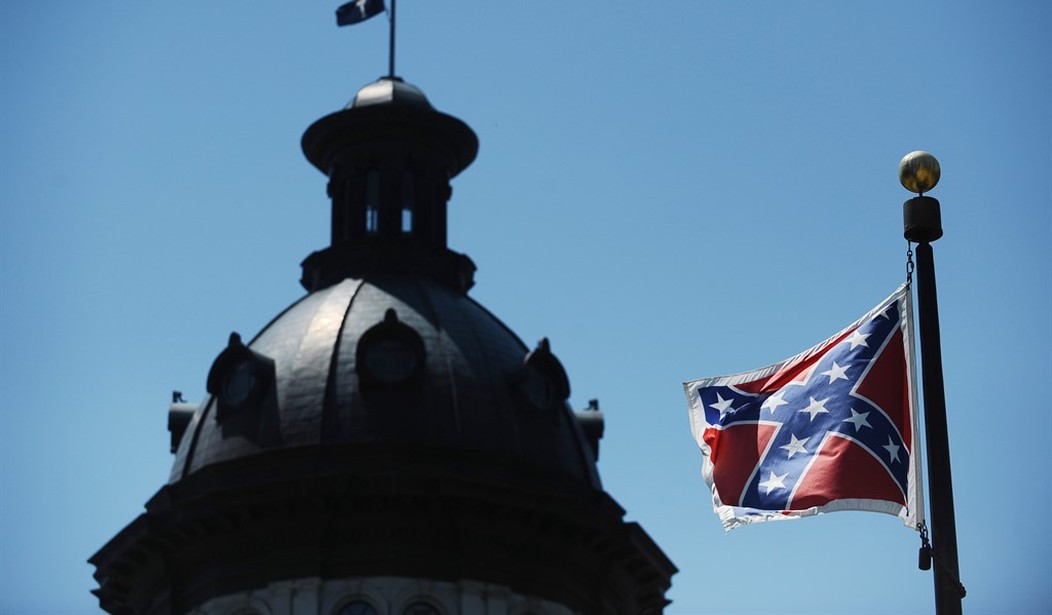Some conservatives have seen efforts to remove the Confederate battle flag from the statehouse in Columbia, South Carolina, and also from other public places around the South, as the beginning of a slippery slope in which roads and landmarks named after Confederate figures are changed, monuments are removed, and a significant part of American history is obscured from view.
"The Left's 21st century agenda: expunging every trace of respect, recognition or acknowledgment of Americans who fought for the Confederacy," tweeted Weekly Standard editor William Kristol on June 23. "It's our own mini-French revolution, expunging history in a frenzy of self-righteousness."
There are clearly some who would like to do just that. David Brooks, the New York Times columnist, recently advocated removing Robert E. Lee's name "from most schools, roads and other institutions, where the name could be seen as acceptance of what he did and stood for during the war."
"This is not about rewriting history," Brooks argued. "It's about shaping the culture going forward."
That's the talk in elite circles. But a new poll suggests that most Americans, white and black, view the flag differently from other memories of the Confederacy and are not on board for the wholesale removal of names and monuments commemorating those who fought for the South in the Civil War.
First, the flag. A new poll, by CNN and ORC International, asked 1,017 adults whether they favor or oppose "removing Confederate flags from government property that is not part of a museum." A majority, although not an overwhelmingly one -- 55 percent -- favors removal. Inside those numbers, 50 percent of whites and 73 percent of blacks support removal.
Majorities in all the nation's regions except the South favor removal, and the South itself is split almost evenly, with 49 percent in support and 50 percent in opposition.
Recommended
The poll was taken from June 26 to June 28, after an intense national discussion about the place of the flag in public life in the aftermath of the Charleston shootings.
Then there is the question of roads, landmarks, monuments and institutions. First, the pollsters asked whether the public supports "renaming streets and highways named after Confederate leaders." Nationally, the result was just 29 percent support, while 68 percent oppose.
Broken down by race, 26 percent of whites approve of renaming streets, while 71 percent oppose. Among blacks, 33 percent approve renaming streets, while 63 percent oppose.
Then the pollsters asked whether the public supports "removing tributes to those who fought for the Confederacy from public places." Whites strongly oppose the idea, with just 21 percent supporting removal and 75 opposing. Blacks are evenly divided, with 49 percent in support and 50 percent in opposition.
There's no region in the country in which a majority supports removing those tributes. Support is just 28 percent in the Northeast, 29 percent in the Midwest, 24 percent in the South, and 24 percent in the West, with majorities around 70 percent opposed in every region.
Solid majorities of both political parties oppose removing tributes, as well. Sixty-three percent of Democrats, 69 percent of independents, and 85 percent of Republicans oppose. Opposition is also fairly even among age and income groups.
The numbers suggest that when it comes to the debate over the place of the Civil War in contemporary life, there is the Confederate battle flag and then there is everything else. In response to the question, "Do you, yourself, see the Confederate flag more as a symbol of Southern pride or more as a symbol of racism?" 57 percent of respondents say Southern pride, 33 percent say racism, and five percent say both equally.
Inside those numbers, 66 percent of whites say the flag is a symbol of Southern pride, while 25 percent say it represents racism. For blacks, the numbers are completely different: 17 percent say the flag is a symbol of Southern pride, while 72 percent say it is a symbol of racism. No other Confederate reminder -- no Lee Highway, no Fort Hood, no war memorial -- produces the kind of lopsided reaction that the flag does.
That could change, of course. The public conversation has been nearly all about the flag in the days since the murders in Charleston, and might at some point turn to the broader issue of Confederate memory. But for now, if the new opinion numbers are accurate, there's no public consensus for a mini-French Revolution.

























Join the conversation as a VIP Member